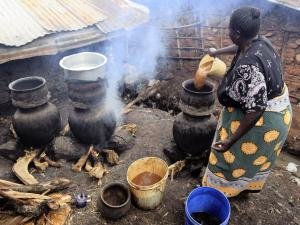By Christina Stellini | Resource Development Volunteer/Fellow
They call it changaa, which means 'kill me quick'. It is an illegal brew served up all over Kibera and its effects are devastating households, and more specifically the children living in them. It was mid-morning this past August and I was working at St. Vincent's Nursery School in Kibera where I spent three months on fellowship. Most often, I worked hidden in the back office plugging away on my computer, only with interruptions for tea and from boisterous young children in bright red uniforms and black shoes covered in red dust and peeking in out of curiosity of my laptop. On this morning, I had a different kind of interruption. A child came to the door and asked me to join our Head Teacher, Alice, in her office a few yards away. I left what I was doing to find out what Alice needed. Upon entering her office, I found her at her desk, listening intently to a parent. This woman was the mother of Deborah, a child from our school. The smell of alcohol was immediately detected despite the early hour. Deborah's mother was screaming and crying trying explain her story, her face badly swollen. She loudly detailed for us the fight she had been in the night before at the local bar, curious, young children peeping in to see what the commotion was about. Deborah's mother then motioned to the black plastic bag sitting on Alice's desk. She lamented that it was all she could afford to feed her children for dinner that night. Alice encouraged me to open it. Inside, I found rotting chicken intestines. Deborah's mother was able to get them for free from the local butcher. It was all she could While I understand the effects of addiction and the tendency to put one's need for alcohol in front of other very pressing needs, in that moment, I had a hard time understanding how this belligerent mother was able to afford alcohol the night before and yet, not have enough to buy food for Deborah and her siblings the very next night. It seemed incomprehensible and more than unfair. Alice explained that it is common practice in the local bars in Kibera to allow patrons to drink on credit and collect payment in the form of in-kind goods or as soon as patrons get paid. This works well in Kibera where most people are unemployed and find occasional day labor from time to time. The numbness of the changaa high helps people escape from the idleness, poverty and inability to put food on the table for their families. And it is cheap to get drunk off of changaa. But it comes with big risks. Not only does it incapacitate those that consume it and make it impossible for them to get work, to make money, or to buy food for their children, it is also often laced with methanol or other addictive chemicals that commonly cause deaths and blindness of those who consume it. It was hard to get the sight and smell of the rotting chicken intestines out of my mind. One week later, I saw Deborah, sullen and small, walking down the road by herself after school. I wondered what she would be going home to that night. It was too difficult to imagine. The children served by St. Vincent's are the most vulnerable in the community. Unfortunately, Deborah and her mother's story are not unique among the families we serve. In fact, we work to specifically select children like Deborah to bring into our school as they are most in need of our help. We then work with parents/caregivers to bring about change in the home through counseling of parents, home visits to monitor the welfare of children, provision of food to households and assistance to parents to start businesses. As we work to make change in the household, we provide children with two nutritious meals each day that keep them physically strong and offer a safe and secure environment where they get respite during each day from the troubles they may find at home.
Project reports on GlobalGiving are posted directly to globalgiving.org by Project Leaders as they are completed, generally every 3-4 months. To protect the integrity of these documents, GlobalGiving does not alter them; therefore you may find some language or formatting issues.
If you donate to this project or have donated to this project, you can receive an email when this project posts a report. You can also subscribe for reports without donating.
Support this important cause by creating a personalized fundraising page.
Start a Fundraiser